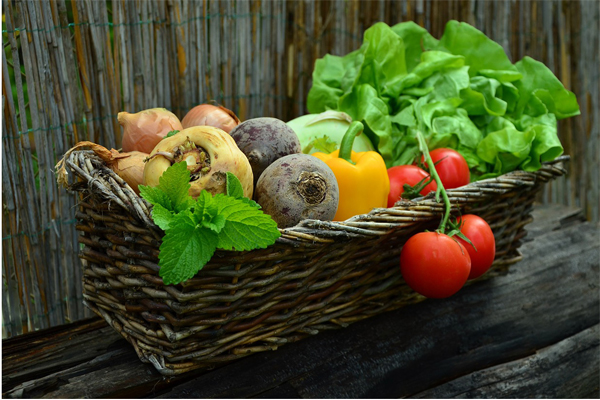Over the years, we have been instructed to eat our vegetables. Although this is a very sound piece of advice, it has not always been the most appealing task, hence, food experts have experimented and shared their tantalizing, and nutritious recipes to help us all achieve this feat.
Vegetables are major sources of vitamins and minerals; they also contain water, fiber and some amount of carbohydrates.
Vitamins and minerals, though required in small amounts (micronutrients), are essential in releasing energy from macronutrients (carbohydrates, proteins, and fats).
The B Vitamins are very important in assisting enzymes to work properly in the body; assisting in the production of DNA, hemoglobin, healthy blood cells, and many other substances. Cauliflower, corn, iceberg lettuce, spinach, squash, okra, lima beans, pak choi, broccoli, pumpkin, green peppers, kale, beetroot, and Chinese cabbage are some common vegetable sources of vitamin B.
Vitamin C (found mostly in vegetables such as pak choi, broccoli, squash, green peppers and kale) helps to prevent cell damage, keeps the immune system healthy, protects against infection and disease, assist with healing of cuts and wounds, maintain healthy teeth and gums and increase absorption of iron from some foods.
Vitamin A, one of the four fat-soluble vitamins (D, E & K are the others) is essential in improving vision, keeping skin healthy, and promoting normal growth and development. Rich vegetable sources of vitamin A are pak choi, broccoli, squash, carrots, Chinese cabbage, kale, pumpkin, and spinach.
Vitamin D (the only vegetable source being mushroom) increases absorption of calcium and phosphorus in the body, which facilitates easy deposition into bones and teeth to make them stronger.
Vitamin K makes proteins, including the protein that causes blood to clot during bleeding to prevent excessive blood loss. Vegetables high in vitamin K include pak choi, broccoli, cabbage, carrots, cauliflower, celery, cucumbers, kale, okra, spinach, and squash.
Both vitamins D and E (squash and pumpkins are rich in vitamin E) protect against cell damage and helps to maintain a healthy immune system. Carotenoids, vitamin E, and C along with selenium (a trace element) all act as antioxidants.
Minerals and trace elements are usually required in even smaller amounts than vitamins. The major minerals in the body are calcium, phosphorus, magnesium, sodium, potassium, chloride, and sulfur. Trace elements are needed in even smaller amounts, the major ones being iron, iodine, zinc and selenium.
Minerals and trace elements work together to maintain proper fluid balance, nerve transmission, muscle contraction, and relaxation; to maintain acid-base balance; to make various proteins in the body; to build strong teeth and bones and to regulate heartbeat.
Calcium (rich in broccoli, cabbage, kale, Chinese cabbage) is the most abundant mineral in the body, and it works with phosphorus to develop and maintain strong teeth and bones. Phosphorus also makes adenosine triphosphate (ATP), the molecule that provides energy to cells. Pumpkin and squash seeds, basil, kale, scallions, and cucumbers are good vegetable sources of phosphorus.
Magnesium’s most notable functions are to keep the heartbeat steady; along with sodium it maintains normal nerve and muscle function; along with sulfur it regulates blood glucose levels and assists in energy and protein production. Dark green leafy vegetables, pumpkin, and squash seeds are rich sources of magnesium. Sodium’s other function is to control blood pressure and volume, as well as to ensure the nerves and muscles work well. Major vegetable sources of sodium are beets and celery. Major vegetable sources of sulfur are onions, garlic, cabbage, lettuce, and kale.
Potassium is an electrolyte with functions including controlling the electrical activity of the heart, building proteins and muscles, assisting in breakdown and use of carbohydrates, and controlling the body’s acid-base balance. It is found mostly in broccoli, lima beans, tomatoes, squash, pumpkin, carrots, and dark green leafy vegetables. Chloride is another essential mineral in maintaining body fluid balance and is also part of the digestive juices in the stomach. Celery, lettuce, and tomatoes are common sources of Chloride.
The trace element iron (see article: “Always Tired? This May Be The Solution!“) is mostly responsible for making hemoglobin, which is important in carrying oxygen around the body. Major vegetable sources are dark green leafy vegetables. While iodine, is important for making thyroid hormones, and for converting food into energy, iodine is normally present in vegetables that were grown in iodine-rich soil. Kelp (seaweed) however, is rich in iodine.
Zinc and selenium are both important in the maintenance of the body’s immune system. Zinc, through cell growth and wound healing; and selenium, through prevention of cell damage by creating antioxidants. The zinc in vegetables is not available for use in the body; and similarly to iodine, selenium-rich soil will produce selenium-rich vegetables. Garlic, however, is rich in selenium.
It is, therefore, important to include a variety of vegetables in the daily diet to be sure you obtain all the possible benefits of vegetables.
Photo credit: pixabay.com


